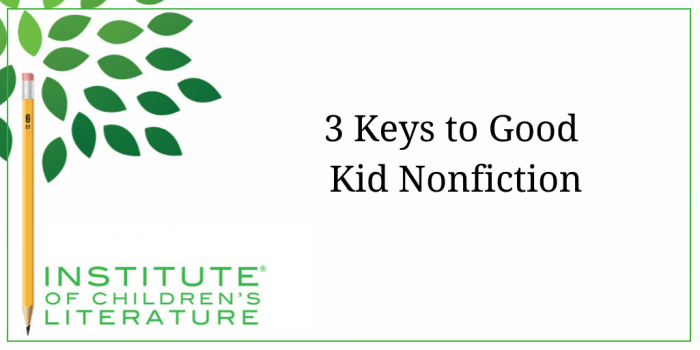1000 N. West Street #1200, Wilmington, DE 19801
© 2024 Direct Learning Systems, Inc. All rights reserved.

Last week, I talked about writing things that were sure to make a sale for me, sure to give me that reward. One of those things for many writers is nonfiction.

Kid nonfiction no longer tries to give readers an encyclopedic view of a topic. Instead, authors choose a focus, a way into the topic that carries the most potential and excitement. For example, suppose I was very interested in adventurers and wanted to use my interest to write some nonfiction. I wouldn’t write an encyclopedic article on what makes an adventurer, mentioning a dozen adventurers through history. Instead, I would focus on one particular, overlooked adventurer like Viking Gudrid Thorbjarnardottir who (through her adventures) somehow changed the world, and I would use this person as a vehicle to share with readers about adventurers. If I wanted to write about green technology, I would choose one specific element and look specifically at it, sharing about the larger subject through the specifics of the smaller focus.
Focus can also help a writer with organization. Now many writers don’t outline before writing the article, but if you cannot create an outline that describes the structure of the FINISHED article, then you have organizational problems. A successful focus should allow you to approach the topic logically and smoothly. It should allow you to classify important things you want to include –group them — and move from one to the next logically. If you find odd things just happened to get tucked into a paragraph, making it difficult to say that paragraph is about a single thing, then you need to look closer at your organization.
A focused well-organized article should be able to be summed up in one sentence. For example, an article I sold to Highlights might be summed up this way: “The final Peary expedition to the North Pole overcame conditions totally incompatible to human life and secured a permanent place in history.” This one sentence sums up what is found in the article — specifics about the harshness of the location, specifics about the suffering of the people, and a peek at the historical significance. With a solid three-fold structure, organization could be smooth and simple. A three-fold structure to your organization will often produce a solid nonfiction article for most magazines.
Good kid nonfiction is so intensely researched that the writer becomes a kind of expert on the subject so that that expertise can be translated into clear readable prose. It’s very difficult to write clearly about something you don’t totally understand and I can always spot places where a writer is fudging over something she isn’t really sure about. And intense research will lead to intense excitement about the subject—if you find the research boring, you’ve picked the wrong subject. It’s also very difficult to write exciting prose about a subject that bores you.

Passive voice tends to creep into nonfiction because it feels more “writerly” when we’re approaching nonfiction. It’s also a sure sign of missing that really crisp readable style. So always check your sentences and make sure the subject of the sentence is doing something and not being done to — then you’ll be writing stronger and with more vitality.
Kid appeal can come from a number of different sources. If you can put a kid into the article—you’ll have kid appeal. For example, an article about a specific kid training for the Olympics is going to be more appealing than a non-specific article outlining how much training is necessary for Olympic athletes. An article on a kid who started a community project to recycle water bottles is going to be more interesting than an article on the importance of recycling. To catch a kid, show a kid—it’s definitely more appealing. And for teen magazines, it’s virtually essential. Few teen magazines approach any kind of topic without specific kids in the piece sharing from their own experience.

A third sure fire kid appeal is humor. Humor is one of the ways many magazines present material that might seem didactic otherwise. Humor is a major element of most teen quizzes, where readers laugh but also think more about what makes a good friend, what is an appropriate boy/girl relationship, how to handle parent/kid friction, etc. Humor can also play a point in other kinds of nonfiction, adding a bright moment to some heavy facts.
One question every writer should ask himself/herself—why will a kid want to read this? Ultimately, that question is more important than “Why should a kid read this?” It doesn’t matter how much good an article will do if a kid won’t read it. So, make certain kids you catch the reader with your focus, vitality and appeal. You’ll make editors happier too.
With over 100 books in publication, Jan Fields writes both chapter books for children and mystery novels for adults. She’s also known for a variety of experiences teaching writing, from one session SCBWI events to lengthier Highlights Foundation workshops to these blog posts for the Institute of Children’s Literature. As a former ICL instructor, Jan enjoys equipping writers for success in whatever way she can.
1000 N. West Street #1200, Wilmington, DE 19801
© 2024 Direct Learning Systems, Inc. All rights reserved.
1000 N. West Street #1200, Wilmington, DE 19801
© 2024 Direct Learning Systems, Inc. All rights reserved.
1000 N. West Street #1200, Wilmington, DE 19801
© 2024 Direct Learning Systems, Inc. All rights reserved.
1000 N. West Street #1200, Wilmington, DE 19801
© 2024 Direct Learning Systems, Inc. All rights reserved.

1000 N. West Street #1200, Wilmington, DE 19801
© 2025 Direct Learning Systems, Inc. All rights reserved.

1000 N. West Street #1200, Wilmington, DE 19801
©2025 Direct Learning Systems, Inc. All rights reserved. Privacy Policy.